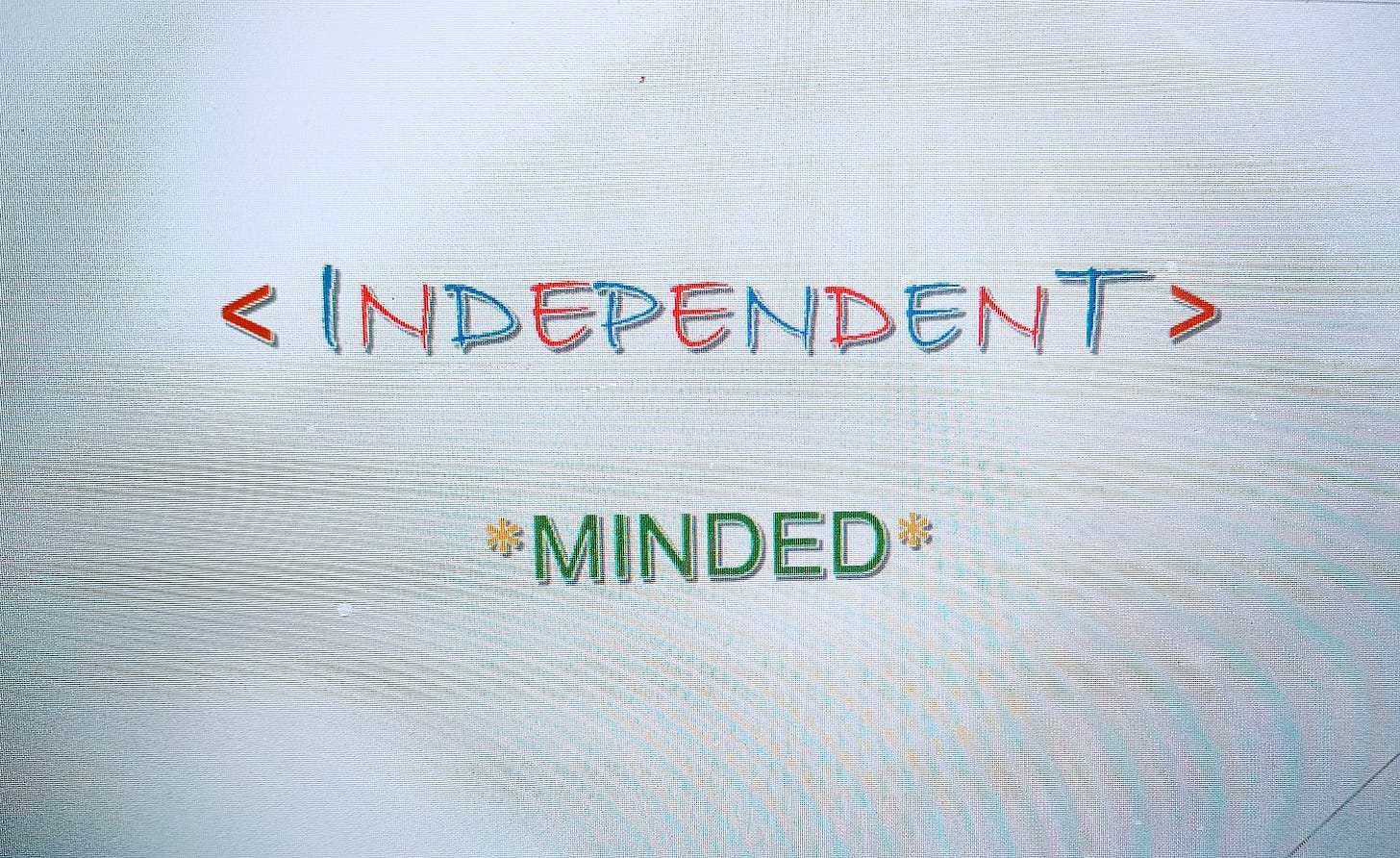On Being Independent
The Value of Being Politically Independent
Our nation's midterm elections are mostly over, and once again independents have played a huge role in many of these elections. Being an independent is an important part of who I am. Years ago, as a Christian twenty something year old, I noticed that many Christian groups and denominations claimed to believe in the literal interpretation of the Bible. However, for every group, there was a different interpretation of many scriptures. My reaction was to realize that they couldn’t all be correct, so I asked myself, “How can I know if I’m right?” Since then, I have tried to think independently about my faith, reading the Bible for myself with prayer, considering all the various interpretations, and reflecting on my own experiences. That practice has influenced me to be more independent minded in other areas of my life, especially politics.
Not long ago, I read a very interesting article by David French, a journalist with “The Dispatch," who on 9/5/22 wrote an article called, “Does Ideology Shape Community, or Community Shape Ideology?" He related research on how the groups with which we associate are extremely influential in forming our opinions about religion and politics. He concluded, “More people form their convictions from their communities than form their communities from their convictions.” He referred to a study by Cass Sunstein, who came up with the Law of Group Polarization, namely that “when like-minded people gather together, they tend to become more extreme.” French also talked about the “Big Sort,” an observation by Bill Bishop in 2008 regarding an increasing tendency of Americans to cluster in like-minded groups. Green concluded that when you combine the two concepts, you end up with extreme polarization of political parties.
My reaction to that article was “This is why I try to be independent in my politics!” I don’t want my opinion to be the result of what all my friends or my family believe, one way or another, especially regarding many highly controversial subjects. Think of abortion, unions, gay rights, integration, affirmative action, public schooling, gun violence, medical inoculations, global warming, and so on. I want to think for myself! Psychologists might be right that this is not totally possible, but I am determined to make an effort.
One thing that has helped me be independent is that while most of the church friends that I have associated with for years have been mostly quite conservative politically, several of my siblings are quite liberal. I listen to both. Another help is being intentional. I don’t identify myself with one or another political party. In fact, I tried briefly to start my own party and then temporarily joined an independent party. The article that French reviewed indicates to me that the labels we identify with have a huge impact on our opinions. If, for example, I think of myself as Republican, it’s natural to be somewhat more inclined to want to agree with well known Republicans, and vice versa, with Democrats. In reality, I tend to agree with the position of Democrats more than Republicans, but not entirely. I tend to vote Democrat, but I refuse to call myself a Democrat in order to keep an independent perspective. I’m not saying people should not join a party. I’m just relating what fits me personally.
Another help toward independent thinking is to notice the buzz words that groups use to keep their members in line with their decided point of view. Examples are “2nd Amendment rights” for gun rights people. Just mention gun regulation and that phrase always gets used. “Stand in solidarity” is a buzz phrase for pro-union people. They’re implying, “Don’t even think there could be an alternative to unions. If you do, you’re not a good progressive person.” Abortion issues have their own buzz words, whether pro or con: “right to life” and “woman’s right to choose.” “Conservation” can be its own buzz word. In some of these issues, I’m right in the middle, although that can make me unpopular in itself. With many people, you have to agree all the way or you’re considered ungodly, un-American or not progressive.
David Green did have a hopeful note from research on how to lessen polarization. In another article, "Community, Ideology and Cancel Culture," 9/28/22, Green wrote, "Persuasive minorities can have an outsized effect, even on dominant majorities." Green quoted Sunstein's research which produced evidence that a "dissenting view blocks the polarization process. It stops like-minded people from moving to extreme positions when they only talk to each other." Give Green's article a read for a more thorough description of that research. The take away is that there is hope!
On a final personal note, as a Christian I try to evaluate controversial issues using my understanding of the Bible, listening to and evaluating how other people interpret the Bible, looking at what fits the concepts that our nation stands for as a democratic republic, what makes common sense in the details of the issues, and prayer. Of course that doesn’t mean I am certain to get it right. Some of my views develop and change as my understanding changes. However, I hope this article will influence you to try to be independent minded in your own way!

